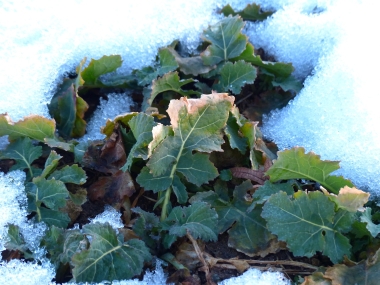There are many things you can do in your vegetable garden in the winter, depending on your geographic location and climate. Here are some ideas :
- Clean up your vegetable garden by removing weeds, dead leaves and plant debris that have accumulated during the warm season. This will allow your soil to breathe and prepare for the next growing season.
- Plant winter vegetables such as cabbage, spinach, leeks, turnips and onions. These vegetables can withstand colder temperatures and will yield well even in winter.
- If you have fruit trees in your garden, now is the perfect time to prune them to encourage healthy growth and abundant fruit production the following year.
- Protect your sensitive plants from frost by covering them with tarps, mulch or temporary shelters. This will help maintain warmth and moisture around the plants and protect them from extreme temperatures.
- Remember to water your plants regularly, even in winter. Soil can dry out in the winter, especially if the weather is dry and sunny, so be sure to give your plants enough water to keep them healthy.
Can I plant cabbage in the winter ?

Yes, you can plant cabbage in the winter. Cabbages are hardy winter vegetables that can withstand cold temperatures and produce good yields even in winter. To plant cabbages in winter, choose a variety that is suited to your climate and geographic location. Prepare a garden bed by turning the soil and removing weeds. Plant the cabbages, spacing them far enough apart so that they can grow without crowding each other. Water the plants well to help them establish and grow. Cover the plants with mulch or a tarp to protect them from frost and extreme temperatures. Follow these steps to plant cabbage in winter and you should have healthy, productive plants.
Is it possible to grow spinach in the cold ?

Yes, you can plant spinach in the winter. Spinach is a hardy winter vegetable that can withstand cold temperatures and give good yields even in winter. To plant spinach in the winter, choose a variety that is appropriate for your climate and geographic location. Prepare a garden bed by turning the soil and removing weeds. Plant the spinach, spacing it far enough apart so that it can grow without crowding. Water the plants well to help them establish and grow. Cover the plants with mulch or a tarp to protect them from frost and temperature extremes. Follow these steps for winter spinach planting and you should have healthy, productive plants.
The winter must-have : leeks

You can plant leeks in winter. Leeks are hardy winter vegetables that can withstand cold temperatures and produce good yields even in winter. To plant leeks in winter, choose a variety that is suitable for your climate and geographic location. Prepare a garden bed by turning the soil and removing weeds. Plant the leeks, spacing them far enough apart so they can grow without crowding each other. Water the plants well to help them establish and grow. Cover the plants with mulch or a tarp to protect them from frost and temperature extremes. Follow these steps to plant leeks in winter and you should have healthy, productive plants.
What vegetable produces a lot in winter ?

Turnips are a hardy winter vegetable that can withstand cold temperatures and produce good yields even in winter. To plant turnips in winter, choose a variety that is suited to your climate and geographic location. Prepare a garden bed by turning the soil and removing weeds. Plant the turnips, spacing them far enough apart so that they can grow without crowding each other. Water the plants well to help them establish and grow. Cover the plants with mulch or a tarp to protect them from frost and temperature extremes. Follow these steps to plant turnips in winter and you should have healthy, productive plants.
The Onion Must-Have

Onions are hardy winter vegetables that can withstand cold temperatures and produce good yields even in winter. To plant onions in winter, choose a variety that is suited to your climate and geographic location. Prepare a garden bed by turning the soil and removing weeds. Plant the onions spaced far enough apart so they can grow without crowding each other. Water the plants well to help them establish and grow. Cover the plants with mulch or a tarp to protect them from frost and temperature extremes. Follow these steps to plant onions in winter and you should have healthy, productive plants.







